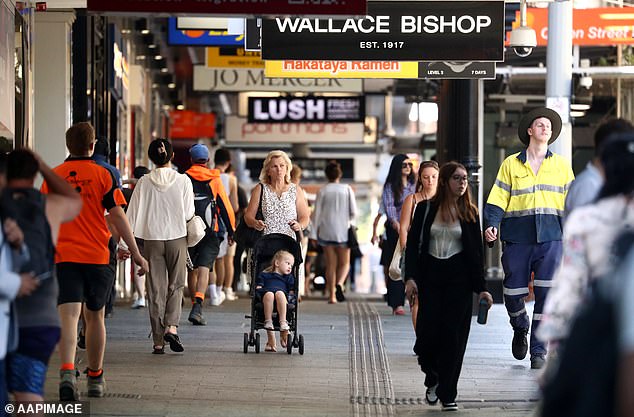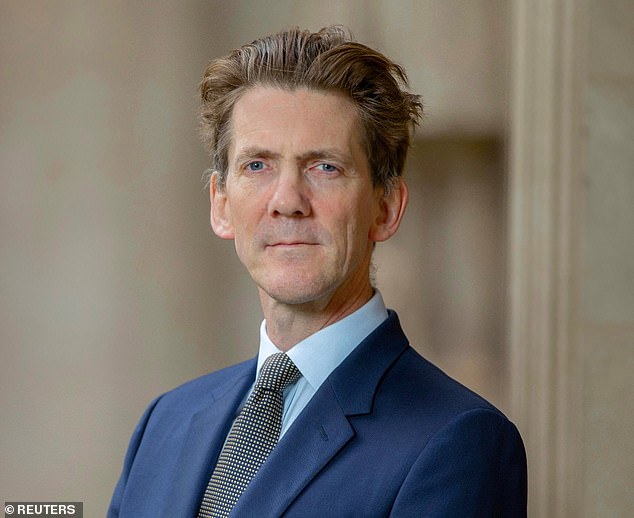A senior Reserve Bank official has hit out at critics who demand it deliver perfect predictions, saying central bankers are not immune to the human tendency toward overconfidence.
Andrew Hauser, the new deputy governor of the RBA, gave a speech entitled ‘Beware of false prophets’ warning against overconfidence when predicting the future.
“It is right to want to have confidence that the central bank will bring inflation back to target and maintain full employment – that is the RBA’s mandate, and we must be held accountable for that,” he told an Australian Economic Society luncheon in Brisbane on Monday.
‘But the political strategy necessary to achieve that outcome, and the economic judgments that underpin it, simply cannot be stated with the same degree of certainty.
“Those who say otherwise are false prophets.”
He also said that erroneous media forecasts could affect people’s lives, adding that it was better to admit that the answer was not known as Australians faced a cost of living crisis.
“Of course, eye-catching language sells newspapers, wins customers and draws crowds to the podium,” Hauser said.
“But when the stakes are so high, claiming supreme confidence or certainty about an inherently uncertain and ambiguous perspective is a dangerous game.”
Andrew Hauser, the new deputy governor of the RBA, has delivered a speech entitled ‘Beware of false prophets’ warning against overconfidence in predicting the future.
That certainty risked “leading to poor analysis and decision-making that could undermine the well-being of all Australians,” he said.
‘Beware of anyone who claims that it is obvious what to do, because they are false prophets.
In many cases, the answer we should give is that we simply don’t know.
“But it can be difficult to say that, especially if your job is to give an opinion, and especially when even small changes in judgment can have first-order effects on people’s lives.”
Hauser said unexpected events often led to bold economic predictions based on less data.
“As humans, we are all prone to overconfidence, particularly when forecasting the future,” he said.
“In some cases, uncertainty may lead us to be less active, as we wait for more data or try to avoid triggering extreme risks through our own actions,” he said.
‘In other cases, it may induce people to be more activist: for example, the asymmetry of potential outcomes underpins the policy response in many countries during the Covid-19 pandemic.’
Mr Hauser said monetary policy also required making predictions about inflation and unemployment.
“When we set interest rates, we have to look to the future, that is, make predictions,” he said.

Mr Hauser, who spent three decades at the Bank of England, also said the RBA’s misguided forecasts could impact on people’s lives, adding it was better to admit the answer was unknown as Australians grappled with a cost-of-living crisis.
‘That’s one source of uncertainty. Monetary policy works with long and variable lags, so our forecasts have to be medium-term, not short-term. That’s a second source of uncertainty.
‘And most importantly, the things we are forecasting – inflation and unemployment – are the complex, time-varying outcomes of decisions and interactions among many millions of individuals, businesses and other organizations.’
Mr Hauser speaks out after former Reserve Bank Governor Philip Lowe in 2021 predicted interest rates would remain at a record low of 0.1 per cent until 2024 “at the earliest”.
Dr Lowe later regretted making those predictions, which were made during the Covid lockdowns but before Russia’s invasion of Ukraine caused oil prices to spike.
Michele Bullock replaced him as governor in September last year, and Treasurer Jim Chalmers declined to extend Dr Lowe’s term for another three years.
The Reserve Bank this month updated its forecasts for headline inflation – also known as the consumer price index – to remain within the RBA’s 2 to 3 per cent target band until December 2026.
But underlying inflation, excluding volatile items such as gasoline, is still forecast to moderate to within the RBA’s target band by the end of 2025.
Last week the Reserve Bank left interest rates unchanged at a 12-year high of 4.35 percent, but Bullock told reporters a rate cut was unlikely over the next six months.
This came despite the 30-day interbank futures market continuing to forecast rate cuts in November and December, and the European Union, the United Kingdom and Canada all embarking on rate cuts this year.


